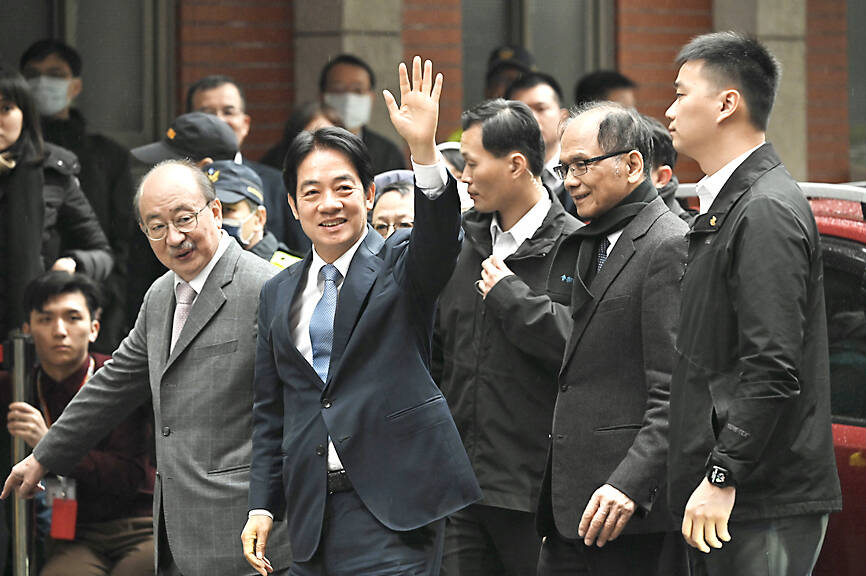More than half of Taiwanese approve of president-elect William Lai’s (賴清德) objection to the so-called “1992 consensus” and “one country, two systems,” a Taiwan Public Opinion Foundation poll showed yesterday.
The landline and mobile phone survey was conducted after the Jan. 13 election from Monday to Wednesday last week, collecting 1,083 valid responses from Taiwanese aged 20 or older.
The poll showed that 53.5 percent of respondents said they agree with Lai’s stance, while 33.6 percent disagreed.

Photo: Tu Chien-jung, Taipei Times
The so-called “1992 consensus” — a term that former Mainland Affairs Council chairman Su Chi (蘇起) in 2006 admitted making up in 2000 — refers to a tacit understanding between the Chinese Nationalist Party (KMT) and the Chinese Communist Party that both sides of the Taiwan Strait acknowledge that there is “one China,” with each side having its own interpretation of what “China” means.
The majority in all age groups supported Lai’s position, although younger respondents were more likely to agree, the foundation said.
Asked whether they feared China would take military action against Taiwan after Lai’s election, 69 percent said they were not concerned that his election would cause China to expedite any potential invasion plans, while 27.3 percent said they were worried.
The results show that suggestions by KMT candidates that a vote for Lai would provoke China did not hold much sway over the public, the foundation said.
Meanwhile, three-quarters of respondents said they disagreed with former president Ma Ying-jeou’s (馬英九) statement before the election that Taiwanese “must trust” Chinese President Xi Jinping (習近平) when it comes to cross-strait issues.
Only 12.5 percent agreed with Ma’s statement.
The poll also showed that 44.2 percent of Taiwanese support independence, 10.9 percent support unification with China and 33 percent support maintaining the “status quo.”
On post-election governance, nearly 60 percent said that the government should form a coalition Cabinet since no party received a majority in the legislature, while 22 percent disagreed.
The poll had a confidence level of 95 percent and margin of error of 2.98 percentage points.

ENDEAVOR MANTA: The ship is programmed to automatically return to its designated home port and would self-destruct if seized by another party The Endeavor Manta, Taiwan’s first military-specification uncrewed surface vehicle (USV) tailor-made to operate in the Taiwan Strait in a bid to bolster the nation’s asymmetric combat capabilities made its first appearance at Kaohsiung’s Singda Harbor yesterday. Taking inspiration from Ukraine’s navy, which is using USVs to force Russia’s Black Sea fleet to take shelter within its own ports, CSBC Taiwan (台灣國際造船) established a research and development unit on USVs last year, CSBC chairman Huang Cheng-hung (黃正弘) said. With the exception of the satellite guidance system and the outboard motors — which were purchased from foreign companies that were not affiliated with Chinese-funded

PERMIT REVOKED: The influencer at a news conference said the National Immigration Agency was infringing on human rights and persecuting Chinese spouses Chinese influencer “Yaya in Taiwan” (亞亞在台灣) yesterday evening voluntarily left Taiwan, despite saying yesterday morning that she had “no intention” of leaving after her residence permit was revoked over her comments on Taiwan being “unified” with China by military force. The Ministry of the Interior yesterday had said that it could forcibly deport the influencer at midnight, but was considering taking a more flexible approach and beginning procedures this morning. The influencer, whose given name is Liu Zhenya (劉振亞), departed on a 8:45pm flight from Taipei International Airport (Songshan airport) to Fuzhou, China. Liu held a news conference at the airport at 7pm,

Taiwan was ranked the fourth-safest country in the world with a score of 82.9, trailing only Andorra, the United Arab Emirates and Qatar in Numbeo’s Safety Index by Country report. Taiwan’s score improved by 0.1 points compared with last year’s mid-year report, which had Taiwan fourth with a score of 82.8. However, both scores were lower than in last year’s first review, when Taiwan scored 83.3, and are a long way from when Taiwan was named the second-safest country in the world in 2021, scoring 84.8. Taiwan ranked higher than Singapore in ninth with a score of 77.4 and Japan in 10th with

GRIDLOCK: The National Fire Agency’s Special Search and Rescue team is on standby to travel to the countries to help out with the rescue effort A powerful earthquake rocked Myanmar and neighboring Thailand yesterday, killing at least three people in Bangkok and burying dozens when a high-rise building under construction collapsed. Footage shared on social media from Myanmar’s second-largest city showed widespread destruction, raising fears that many were trapped under the rubble or killed. The magnitude 7.7 earthquake, with an epicenter near Mandalay in Myanmar, struck at midday and was followed by a strong magnitude 6.4 aftershock. The extent of death, injury and destruction — especially in Myanmar, which is embroiled in a civil war and where information is tightly controlled at the best of times —